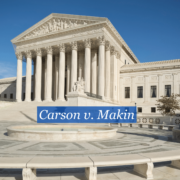Securing Religious Liberty Rights in Maine
Pioneer Law’s role in winning the Carson v. Makin case at the Supreme Court
On June 21, 2022, the U.S. Supreme Court ruled in Carson v. Makin that a Maine school tuition law that excluded religious schools was unconstitutional. Pioneer Public Interest Law Center, then known as PioneerLegal, had filed an amicus curiae brief urging the Court to strike down the Maine law.
In the Court’s 2020 ruling in Espinoza v. Montana Department of Revenue, Chief Justice John Roberts wrote that “A state need not subsidize private education. But once a state decides to do so, it cannot disqualify some private schools solely because they are religious.”
For over a century, until the early 1980s, religiously affiliated schools were included in the Maine school tuitioning program, under which communities that don’t have their own schools can either contract with a school or allow parents to use the per-pupil spending allotment to attend the public or private school of their choice. The Maine state legislature, driven by the Senate chair of the education committee, re-codified the program in 1982 to prohibit parents and students from using the law to access religious schools, as was originally intended in 1873.
Pioneer Institute Executive Director Jim Stergios noted that Maine law allowed parents to access the public or private education that best suits their children except if the school was religiously affiliated — a practice that, in light of the Espinoza decision, was clearly counter to the Constitution.
